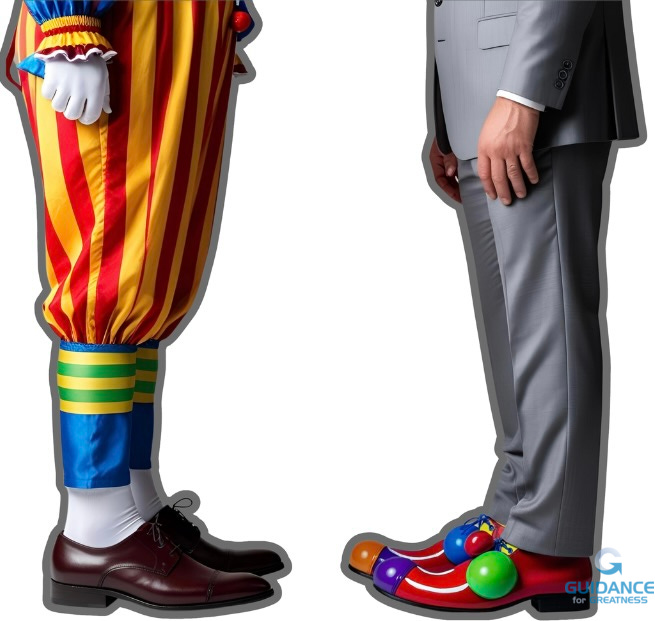Empathy is about standing in someone else's shoes, feeling with his or her heart, seeing with his or her eyes.
You’ve heard it. You’ve said it probably. And so have I. It’s a well-worn cliche, but a useful one. The metaphor of standing in someone else’s shoes creates such a clear picture in your head. What do things look like from another’s perspective, from over there?
If you really want to dive deep, try pointing those strange shoes and your gaze at yourself and see how you look from this other person’s perspective.
Yowza!
Most leadership advice suggests that empathy is a key component to effective leadership, and I won’t disagree. Leaders empathize to improve their ability to communicate and to compromise. Being more fully aware of what others are thinking, feeling, and experiencing and why allows leaders to connect. Such connection builds and strengthens relationships, which form the pumping heart of leadership.
When used wisely, empathy increases our capacity for caring. It can spark us to feel compassion and to lend a hand. Leaders use empathy to build better teams.
Leaders model empathy for others simply by practicing it. They also guide others to be more empathetic. This effort bakes empathy into the culture, which makes the whole organization more functional. After all, if you lack empathy—that basic ability to understand how others operate—how can you develop effective teams?
All true, and I stand by it.
But…
Empathy is not inherently good. Empathy can be a component of morality, but it’s not moral in itself. For instance, if you empathize with someone doing harm, you potentially become complicit in that harm. We see it all the time. Even the most callous person can suddenly transform into a wellspring of patient empathy when contemplating the reprehensible activities of their favorite politician.
Some people even empathize to condone the bad behavior of bosses. “You must understand,” they proclaim. “She’s having a hard day/week/year/lifetime/ancestral bloodline.”
Everyone is entitled to a rough patch, to be sure. I’ve had plenty. I also acknowledge that my leadership lapsed during those times. I was not a good leader although I think I stayed well above the level of crappy boss.
My point is that how and why you apply and express empathy is just as important as whether you have the potential for empathy at all. Not all empathy is equal.
Positively Empathetic
One of the most powerful expressions of empathy exists in a song: Bob Dylan’s “Positively 4th Street.”
The 1966 lyrics open with an outcry of pure bitterness, like a mouthful of battery acid:
You got a lotta nerve To say you are my friend When I was down You just stood there grinning
I wish I could say Dylan’s mood improves from there, but every verse of this four-minute diatribe drips caustic resentment. For instance, don’t let this little blast of seeming empathy that appears toward the end deceive you:
And now I know you’re dissatisfied With your position and your place
Wow! Has Dylan sloughed off his own bitterness enough to recognize and acknowledge this other person’s bitterness? Perhaps they can be fast fellows bonding over their shared acrimony. Oh, but then he quickly adds,
Don’t you understand It’s not my problem
Empathy offered, empathy denied!
Despite all this nastiness, a perfect articulation of empathy explodes into the song in the penultimate verse:
I wish that for just one time You could stand inside my shoes And just for that one moment I could be you
It’s such a stirring notion that he repeats himself in the opening of the final verse:
Yes, I wish that for just one time You could stand inside my shoes
But Dylan can’t seem to wrap up the song without a fatal jab:
You’d know what a drag it is To see you.
If you’re willing to overlook the spite, you’ll see these lines perfectly portray empathy, at least in the technical sense. You stand here, and I stand there so that we can see ourselves from each other’s point of view.
This full-on adoption of another’s perspective constitutes empathy but only to set up the ending’s vicious twist. Notice that Dylan never truly seeks to see himself from the other’s point of view. Not at all. Instead, he wants the other person to feel empathy for Dylan, to discover how miserable Dylan feels at the mere sight of this person.
In fact, Dylan’s game of switcheroo attempts to force empathy on another while experiencing none himself. It’s a non-consensual imposition—reverse or anti-empathy boobytrapped with a land mine of an insult.
The “Meh” Morality of Empathy
Dylan’s song really gets to the heart of the various potentials of empathy. Again, empathy—no matter how critical to good relationships and leadership—is neither moral nor immoral in itself. We can see from Dylan’s lyrics that how one deploys empathy alone determines its moral caliber.
Furthermore, as Dylan indicates, empathy can be imposed. Or maybe a better word is “extracted.” This is what happens when someone excuses a boss’s bad behavior with a strident, “You have to understand.”
Do I? Why? Why should I have to stand in the boss’s shoes if the boss—being a boss—won’t do the same for me? Even Dylan at his bitterest proposed an even exchange of footwear. In contrast, leaders seek to empathize first. Then maybe they’ll ask for understanding.
But one-way, bottom-up enforced empathy is not the only means to abuse it. Some bosses can genuinely empathize, just not for the better.
Leaders—as opposed to bosses—empathize to come to an understanding, to discover the best in people, and to establish relationships that will result in compromise and collaboration.
In contrast, while most bosses don’t or can’t empathize, many bosses who empathize do so to find advantage. You’ve probably seen this yourself, the boss who truly grasps where their team members are coming from only to use it against them. This effort can take a variety of forms, which are generally indistinguishable from gaslighting and other forms of bullying.
For instance, one of my former bosses was superb at sussing out people’s motivations. He could really empathize with the ones driven by raw ambition since he shared that driver. His victims proved easy to manipulate—apply some encouragement here, display a soupçon of disappointment there, add a little reward from time to time, and soon enough the boss had them dancing at the ends of his strings.
On the other hand, the ones driven by a desire to do the right thing seemed opaque to him. They were obstacles and expendable. In these cases, his inability to relate to or empathize with do-gooders was an indicator that they would be loyal to the institution or to principles, not him.
Another way bosses use empathy is by doing like Dylan at the end of his song and extracting it.
A different boss I knew would co-opt the language of her team members to lull them into believing she empathized with them. This pseudo-empathy then induced her team members into empathizing with her and adopting her perspective. No matter how devoted, though, eventually they’d wear down. As soon as they turned less useful to her, she would discard them.
The typical team members’ hunger for the boss’s empathy allowed her get away with this stunt for decades. For all I know, she still pulls it. Empathy—both her insincere edition and their genuine but misdirected version—got her the control she wanted.
The Color of Empathy
Perhaps you’re thinking, “well that’s not real empathy.” If so, I disagree. If empathy is an ability to understand others’ emotions and thoughts, to see things from their perspective, these bosses I described certainly practiced and used it rather effectively.
Remember, empathy lacks any inherent moral color. It’s neither good nor bad. Empathy operates as a tool, not a quality. As with any tool, its use and usefulness depend on the hand that wields it. A hammer can create or demolish.
Bad bosses can use empathy just as well as great leaders. The only difference really is that one does so for nefarious reasons—to manipulate, control and gain power over others—and the other for constructive reasons—to communicate, build relationships, and reach consensus.
Of course, not all bosses are even capable of practicing empathy, but all leaders must be to some degree. They do it all the time for the reasons I mentioned.
Let me leave you on a more positive note. Lest you think Dylan was an utterly unempathetic jerk, here’s another, perhaps more satisfying, taste. In the song “One Too Many Mornings,” written in 1963, he describes a tense exchange with his lover:
It’s a restless hungry feeling That don’t mean no one no good When ev’rything I’m a-sayin’ You can say it just as good. You’re right from your side I’m right from mine
I can’t think of too many 22-year olds who could have the wisdom to write something that beautifully empathetic. In fact, empathy is a hallmark of great art. Artists, like leaders, empathize to understand and create. Bosses who can empathize do so to manipulate and destroy.
Recall that the deepest enlightenment empathy offers comes not when you see things as someone else does but when you see yourself as they do. It’s virtually the opposite of what Dylan puts forward at the end of “Positively 4th Street” and a level of awareness and wisdom I certainly have not attained. Yet.
The main takeaway I want to emphasize is that we’d be wise to avoid endowing empathy with some inherent quality—good or bad. As we see with Dylan’s different approaches, empathy is no virtue. Nor is it an evil. It’s just a tool, and like any tool, its value flows from its use and its user.
How empathetic are you? How do you use or express empathy?
Leaders use empathy to understand others to build relationships, and I can help.
Unlock the Great Leader Within! Download my free resource, the Transform To GREATness Toolkit, now!
I look forward to hearing from you.
Intro and outro podcast theme music by LiteSaturation from Pixabay.
Have you noticed that my podcast sound has improved in recent months?
I started using Descript to record and edit my podcast, and if you record sound and video, so should you. Descript’s AI assistance has transformed my process and improved my recordings. Now editing is a breeze!
Interested? Use my affiliate link to try Descript for free: https://get.descript.com/t8zotbxmi6ds.
Descript serves the novice and the expert to improve workflow and quality.
Let me know if you try it out and what you think.
Need an experienced speaker or a podcast guest? Invite me!
Searching for that elusive engaging, experienced, and knowledgeable speaker for your event or corporate training? Check out my Speaker’s Page.
Looking for an articulate, dynamic, and insightful podcast guest? Check out my Podcast Guest Page.
About Dr. Sal
I founded Guidance for Greatness to mentor rising professionals after serving 30 years in higher education as an English professor, dean, and VP.
In my speaking, writing, and coaching, I blend academic credentials (Ph.D. from Toronto, certificates from Harvard and ACE) with practical coaching certifications (Tiny Habits, Thrive Global) to offer something different: leadership development built upon human decency.
My mission? To guide today’s managers to become the next generation of great leaders.
I offer practical, values-driven strategies so that managers can lead authentically.
Why? Because great leaders aren't just effective managers—they're teachers whose example makes a true difference in the world.
It’s almost here!
Discover the practical strategies that transform good managers into exceptional leaders. Look for my new book, Greater than Great: How to Excel in Leadership through Learning, Logic, and Life to Make a True Difference in the World, in early 2025!
















Share this post